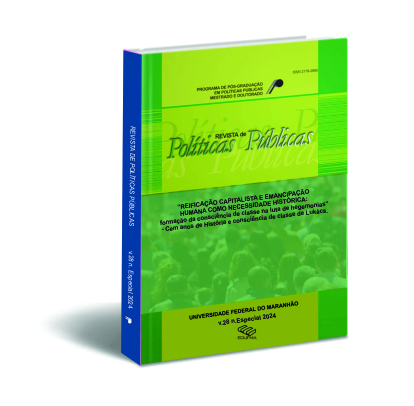A FASCISTIZAÇÃO NO MUNDO CONTEMPORÂNEO: da crise da democracia liberal capitalista ao irracionalismo: rebatimentos na América Latina
DOI :
https://doi.org/10.18764/2178-2865v28nEp.2024.14Mots-clés :
Democracia-liberal, Estado, fascismo, conservadorismoRésumé
A crise profunda, pela qual atravessa o capitalismo na sua forma neoliberal, cria profundas rasuras nas democracias liberais. Marx descreve em O 18 Brumário de Luis Bonaparte, como que, com a perda da hegemonia na sociedade, as classes dominantes veem-se sem alternativas e não relutam em se aliar a projetos antidemocráticos, autoritários, quando lhes convém. Foi esse contexto que permitiu o surgimento e a ascensão de Luis Bonaparte. Nesse momento, percebe-se uma incapacidade da classe dominante em manter a hegemonia da sociedade e garantir, mesmo que formalmente, a ideia de uma universalidade. Vimos, na última década, o ressurgimento de uma extrema-direita organizada e que, em muitos casos, flerta abertamente com o fascismo; decerto numa conjuntura que difere do fascismo clássico, como ocorreu na década de 1920-1930 na Europa, embora mantenha grandes semelhanças. Alain Badiou o conceitua como “fascismo democrático”, pela razão de que as instituições do Estado aparentemente funcionam normalmente. No caso latino americano, é ainda mais complexo, como bem definem Zavaleta e Florestan Fernandes, mesmo porque no continente vigorou uma ideologia fascista que estava incrustrada nas ditaduras militares da região, mas que sobretudo não foram eliminadas. Vimos ressurgir as ideias fascistas em organizações de extrema-direita no continente latino-americano em meio a uma profunda crise econômica, político-ideológico-cultural que governos “progressistas” não conseguiram dar respostas para a maioria da população, jogada em situações de penúria econômica — campo aberto para a ideologia fascista.
Téléchargements
Téléchargements
Publié-e
Comment citer
Numéro
Rubrique
Licence

Cette œuvre est sous licence Creative Commons Attribution - Pas d'Utilisation Commerciale - Pas de Modification 4.0 International.
UNIVERSIDADE FEDERAL DO MARANHÃO
PROGRAMA DE PÓS-GRADUAÇÃO EM POLÍTICAS PÚBLICAS
REVISTA DE POLÍTICAS PÚBLICAS
Termo de Transferência de Direitos Autorais
Como condição para a submissão, os autores devem declarar a autoria do trabalho e concordar com o Termo de Cessão de Direitos Autorais, marcando a caixa de seleção após a leitura das cláusulas)
- Declaro que participei da elaboração do trabalho referido, em parte ou no todo; que não omiti qualquer ligação ou acordo de financiamento entre os autores e instituições ou empresas que possam ter interesses na publicação desse trabalho;
- Declaro tratar-se de texto original, isento de compilação, em parte ou na íntegra, de minha autoria ou de outro (os) autor (es);
- Declaro que o texto não foi enviado a outra revista (impressa ou eletrônica) e não o será enquanto a possibilidade de sua publicação esteja sendo considerada pela RPP;
- Declaro que transfiro os direitos autorais do trabalho especificado para a RPP, comprometendo-me a não reproduzir o texto, total ou parcialmente, em qualquer meio de divulgação, impresso ou eletrônico, sem prévia autorização dessa Revista.
- Declaro que tenho conhecimento que a cessão do texto à RPP é gratuita e, portanto, não haverá qualquer tipo de remuneração pela sua utilização.

Este obra está licenciado com uma Licença Creative Commons Atribuição-NãoComercial-SemDerivações 4.0 Internacional.







